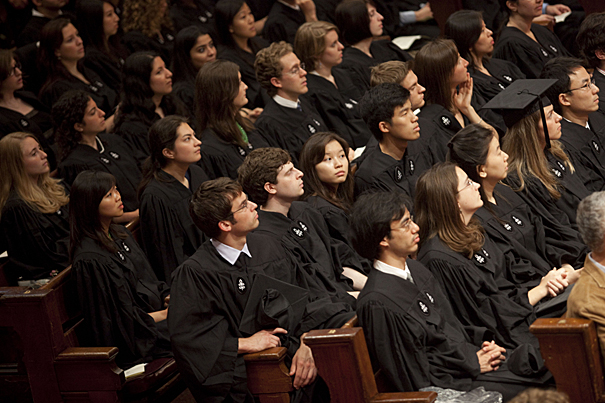
The Literary Exercises have been a Harvard tradition since the 18th century, and take place each year on Tuesday of Commencement Week. Harvard’s Phi Beta Kappa chapter, called Alpha Iota of Massachusetts since 1995, is the oldest continuously running chapter in the United States.
Kris Snibbe/Harvard Staff Photographer
Intellect, rigor, tradition
Harvard’s Literary Exercises celebrate Phi Beta Kappa achievements
In the welcome shade of the verdant trees outside Harvard Hall on this scorching morning (May 25), Trevor Bakker ’10 and 71 other Phi Beta Kappa honorees lined up in their caps and gowns for the traditional fife-and-drum procession to Sanders Theatre.
“It’s the beginning of a celebration,” said the Holland, Mich., senior, who said he landed among the University’s highest achievers without ever drinking coffee. “There are a few of us.”
At Harvard, 24 juniors are elected to Phi Beta Kappa every spring, and 48 seniors each fall. Membership cannot exceed 10 percent of the graduating class.
The Literary Exercises have been a Harvard tradition since the 18th century, and take place each year on Tuesday of Commencement Week. Harvard’s Phi Beta Kappa chapter, called Alpha Iota of Massachusetts since 1995, is the oldest continuously running chapter in the United States.
Today’s Literary Exercises, the 220th, included three musical interludes by the Harvard-Radcliffe Collegium Musicum. The last (another tradition) is Harvard’s “College Hymn,” which exhorts new graduates “for Right ever bravely to live.”
To help the graduates find rightness, two addresses are at the heart of the exercises ceremony. One is by a poet, who reads a work written for the occasion. The other is by an “orator,” a guest invited to offer timely discourse.
This year’s Phi Beta Kappa poet was D.A. Powell, a Georgia-born writer who teaches English at the University of San Francisco. He was once the Briggs-Copeland Lecturer in Poetry at Harvard.
Powell, a prize-winning experimental poet, read his new poem “Panic in the Year Zero,” whose title was inspired by a 1962 movie about nuclear apocalypse. He is a lover of puns and edgy themes, including AIDS. His first three collections of poetry — “Tea,” “Lunch,” and “Cocktails” — are considered a trilogy on the disease.
“In the time I have been alive,” said Powell, “we have lived under the threat of some sort of extinction. And I think that the mission of this poem is to say: enough.” As he writes:
Enough with the apocalypse, already.
Think of all the history you’ve read. It started somewhere.
It started at absolute zero, is what you thought.
Just because you couldn’t know what came before.
But imagine: something did.
Doing the honors as orator was Natalie Zemon Davis, A.M. ’50, LL.D. ’96, a pioneering cultural historian of the early modern period who teaches at the University of Toronto and is professor emerita at Princeton University. Her discourse, a glimpse at past orations and what they promise for the future, was titled “The Possibilities of Friendship.”
Davis is a figure of some renown in the history of women and gender, and in 1971 at the University of Toronto co-founded one of the first courses on the subject in North America.
Her oration marked how the concept of friendship — a central Phi Beta Kappa value — has waxed and waned over the years, as traditions of “sentimental union” through literature vied with stricter measures of academic excellence. But friendship is a mark of hope and excellence in the modern world, said Davis, who looked at the cooperation among Palestinian and Israeli doctors, whose nations are riven by war.
Friendship can “blaze anew,” she said, “illuminating a landscape that may seem desolate but can still carry within in it bridges of truth, truth-telling, and understanding.”
The Literary Exercises are also traditionally when the winners of the annual Alpha Iota Prize for Excellence in Teaching are announced. Prizes this year went to Lawrence Buell, Powell M. Cabot Professor of American Literature; Benjamin M. Friedman, William Joseph Maier Professor of Political Economy; and Richard J. Tarrant, Pope Professor of the Latin Language and Literature.
Phi Beta Kappa Literary Exercises 2010 Kris Snibbe/Harvard Staff Photographer
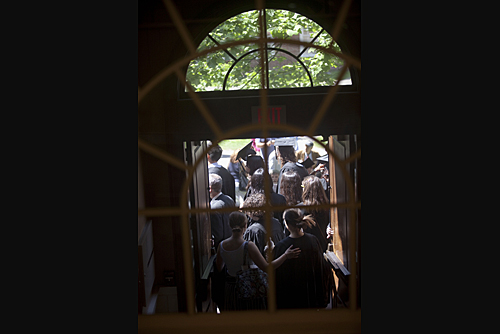
Caps and gowns
Senior Phi Beta Kappa honorees congregate outside Harvard Hall before processing to Sanders Theatre.
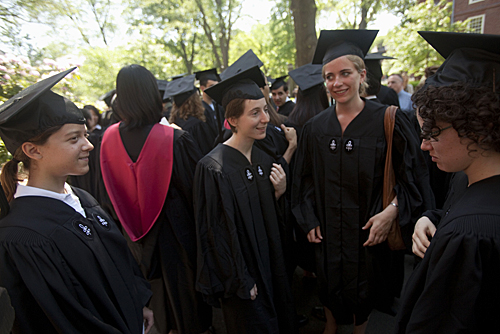
Excitement builds
Johanna Rodda ’10 (from left), Liza Flum ’10, Caroline Bleeke ’10, and Diana Wise ’10 chat excitedly in the soaring heat before heading to PBK’s Literary Exercises, a Harvard tradition since the 18th century.
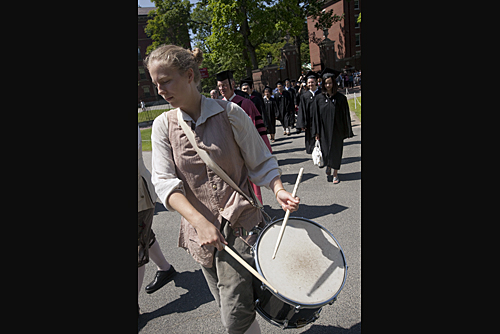
Keeping the beat
Rap-rap-rapping her drum, Rachel Hawkins ’12 leads the procession of PBK honorees — and lets everyone know it.
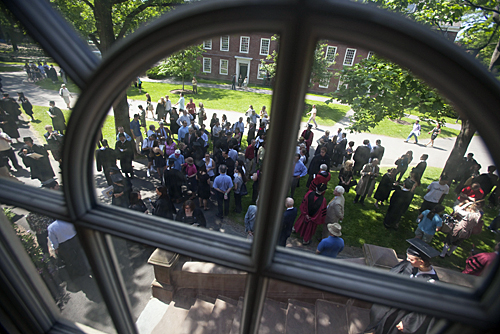
A green scene
Amid the greenery of the Yard, PBK honorees mingle with attendees in a relatively small Commencement fete — on Commencement morning, the Yard fills with more than 30,000 visitors.
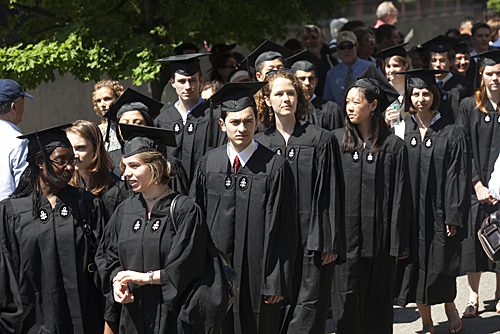
There they go
PBK honorees make their way to Sanders Theatre, where they’ll be delighted by the poetry of D.A. Powell and an oration by Natalie Zemon Davis, A.M. ’50, LL.D. ’96, a pioneering cultural historian.
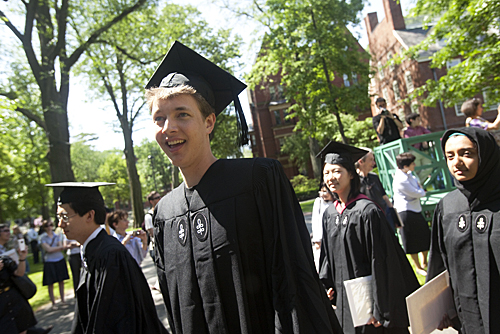
No frowns here
Phi Beta Kappa inductee Trevor Bakker ’10 is just one of the 72 seniors being honored for academic excellence. And, surprisingly, he did it all without coffee’s jolt. “There are a few of us,” he said.
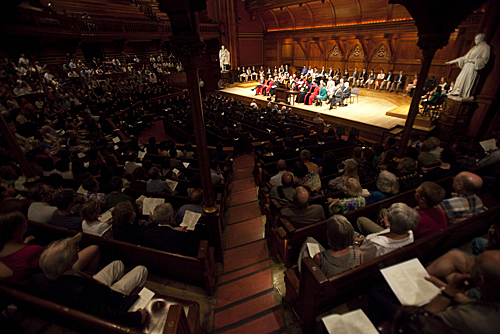
The stage is set
Inside grand Sanders Theatre, the stage is illuminated with scholars who are winners of the annual Alpha Iota Prize for Excellence in Teaching.
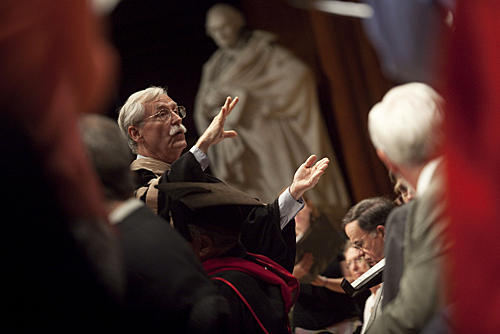
Steady now
Director of choral activities Jameson Marvin conducts the Harvard-Radcliffe Collegium Musicum for three songs, including “College Hymn,” which exhorts new graduates “for Right ever bravely to live.”

‘The Possibilities of Friendship’
Natalie Zemon Davis, A.M. ’50, LL.D. ’96, takes the podium for her speech, “The Possibilities of Friendship,” which offered a glimpse at past orations and what they promise for the future.
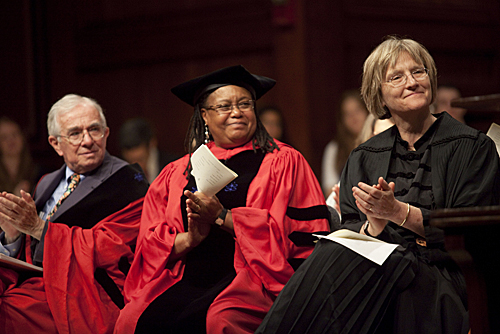
Three in a row
Harvard College Dean Evelynn Hammonds (center) is flanked by President Drew Faust and Everett Mendelsohn, continuing education/special program instructor and research professor of the history of science.

‘Panic in the Year Zero’
Before reading his poem “Panic in the Year Zero,” poet D.A. Powell said, “In the time I have been alive, we have lived under the threat of some sort of extinction. And I think that the mission of this poem is to say: enough.”
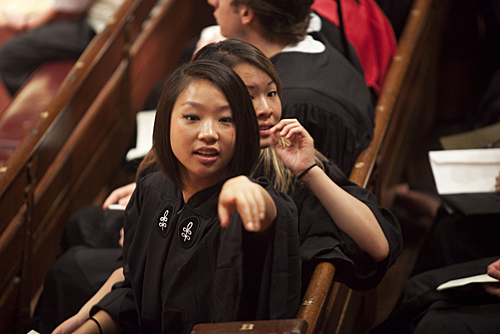
Over here!
Sarah Yun ’10 (front) and Melissa Tran ’10 look for friends and relatives inside the theater.




